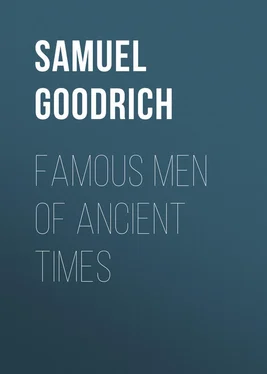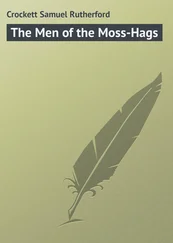Samuel Goodrich - Famous Men of Ancient Times
Здесь есть возможность читать онлайн «Samuel Goodrich - Famous Men of Ancient Times» — ознакомительный отрывок электронной книги совершенно бесплатно, а после прочтения отрывка купить полную версию. В некоторых случаях можно слушать аудио, скачать через торрент в формате fb2 и присутствует краткое содержание. Жанр: foreign_prose, на английском языке. Описание произведения, (предисловие) а так же отзывы посетителей доступны на портале библиотеки ЛибКат.
- Название:Famous Men of Ancient Times
- Автор:
- Жанр:
- Год:неизвестен
- ISBN:нет данных
- Рейтинг книги:5 / 5. Голосов: 1
-
Избранное:Добавить в избранное
- Отзывы:
-
Ваша оценка:
- 100
- 1
- 2
- 3
- 4
- 5
Famous Men of Ancient Times: краткое содержание, описание и аннотация
Предлагаем к чтению аннотацию, описание, краткое содержание или предисловие (зависит от того, что написал сам автор книги «Famous Men of Ancient Times»). Если вы не нашли необходимую информацию о книге — напишите в комментариях, мы постараемся отыскать её.
Famous Men of Ancient Times — читать онлайн ознакомительный отрывок
Ниже представлен текст книги, разбитый по страницам. Система сохранения места последней прочитанной страницы, позволяет с удобством читать онлайн бесплатно книгу «Famous Men of Ancient Times», без необходимости каждый раз заново искать на чём Вы остановились. Поставьте закладку, и сможете в любой момент перейти на страницу, на которой закончили чтение.
Интервал:
Закладка:
During the few months that Mohammed lived after this, Moseilama continued, on the whole, to gain ground, and became at length so formidable, as to occasion extreme anxiety to the prophet, now rapidly sinking under the effects of disease. An expedition, under the command of Caled, the "Sword of God," was ordered out to suppress the rival sect headed by the spurious apostle, and the bewildered imagination of Mohammed, in the moments of delirium, which now afflicted him, was frequently picturing to itself the results of the engagement between his faithful Moslems and these daring apostates.
The army of Caled returned victorious. Moseilama himself, and ten thousand of his followers, were left dead on the field; while the rest, convinced by the shining evidence of truth that gleamed from the swords of the conquerors, renounced their errors, and fell quietly back into the bosom of the Mohammedan church. Several other insurgents of similar pretences, but of minor consequence, were crushed in like manner in the early stages of their defection.
We have now reached the period at which the religion of Mohammed may be considered as having become permanently established. The conquest of Mecca and of the Koreishites had been, in fact, the signal for the submission of the rest of Arabia; and though several of the petty tribes offered, for a time, the show of resistance to the prophet's arms, they were all eventually subdued. Between the taking of Mecca and the period of Mohammed's death, somewhat more than three years elapsed. In that short period he had destroyed the idols of Arabia; had extended his conquests to the borders of the Greek and Persian empires; had rendered his name formidable to those once mighty kingdoms; had tried his arms against the disciplined troops of the former, and defeated them in a desperate encounter at Muta.
His throne was now firmly established; and an impulse given to the Arabian nation, which induced them to invade, and enabled them to conquer, a large portion of the globe. India, Persia, the Greek empire, the whole of Asia Minor, Egypt, Barbary, and Spain, were eventually reduced by their victorious arms. Mohammed himself did not indeed live to see such mighty conquests achieved, but he commenced the train which resulted in this wide-spread dominion, and, before his death, had established over the whole of Arabia, and some parts of Asia, the religion which he had devised.
And now, having arrived at the sixty-third year of his age, and the tenth of the Hegira, A. D. 632, the fatal effects of the poison, which had been so long rankling in his veins, began to discover themselves more and more sensibly, and to operate with alarming virulence. Day by day, he visibly declined, and it was evident that his life was hastening to a close. For some time previous to the event, he was conscious of its approach, and is said to have viewed and awaited it with characteristic firmness. The third day before his dissolution, he ordered himself to be carried to the mosque, that he might, for the last time, address his followers, and bestow upon them his parting prayers and benedictions. Being assisted to mount the pulpit, he edified his brethren by the pious tenor of his dying counsels, and in his own example taught a lesson of humility and penitence, such as we shall scarcely find inculcated in the precepts of the Koran.
"If there be any man," said the prophet, "whom I have unjustly scourged, I submit my own back to the lash of retaliation. Have I aspersed the reputation of any Mussulman? let him proclaim my fault in the face of the congregation. Has any one been despoiled of his goods? the little that I possess shall compensate the principal and the interest of the debt." "Yes," replied a voice from the crowd, "thou owest me three drachms of silver!" Mohammed heard the complaint, satisfied the demand, and thanked his creditor that he had accused him in this world, rather than at the day of judgment. He then set his slaves at liberty, seventeen men and eleven women; directed the order of his funeral; strove to allay the lamentations of his weeping friends, and waited the approach of death. He did not expressly nominate a successor, a step which would have prevented the altercations that afterwards came so near to crushing in its infancy the religion and the empire of the Saracens; but his appointment of Abubeker to supply his place in the function of public prayer, and the other services of the mosque, seemed to intimate indirectly the choice of the prophet. This ancient and faithful friend, accordingly, after much contention, became the first Caliph of the Saracens, though his reign was closed by his death at the end of two years.
The death of Mohammed was hastened by the force of a burning fever, which deprived him at times of the use of reason. In one of these paroxysms of delirium, he demanded pen and paper, that he might compose or dictate a divine book. Omar, who was watching at his side, refused his request, lest the expiring prophet might dictate something which should supersede the Koran. Others, however, expressed a great desire that the book might be written; and so warm a dispute arose in the chamber of the apostle that he was forced to reprove their unbecoming vehemence. The writing was not performed, and many of his followers have mourned the loss of the sublime revelations which his dying visions might have bequeathed to them.
The favorite wife of the prophet, Ayesha, hung over her husband in his last moments, sustaining his drooping head upon her knee, as he lay stretched upon the carpet; watching with trembling anxiety his changing countenance, and listening to the last broken sounds of his voice. His disease, as it drew towards its termination, was attended at intervals with most excruciating pains, which he constantly ascribed to the fatal morsel taken at Chaibar; and as the mother of Bashar, his companion who had died upon the spot from the same cause, stood by his side, be exclaimed, "O mother of Bashar, the cords of my heart are now breaking of the food which I ate with your son at Chaibar." In his conversation with those around him, he mentioned it as a special prerogative granted to him, that the angel of death was not allowed to take his soul till he had respectfully asked permission of him, and this permission he condescendingly granted. Recovering from a swoon into which the violence of his pains had thrown him, he raised his eyes towards the roof of the house, and with faltering accents exclaimed, "O God! pardon my sins. Yes, I come among my fellow-laborers on high!" His face was then sprinkled with water, by his own feeble hand, and shortly after he expired.
The city, and more especially the house of the prophet, became at once a scene of sorrowful but confused lamentation. Some of his followers could not believe that he was dead. "How can he be dead, our witness, our intercessor, our mediator with God? He is not dead. Like Moses and Jesus, he is wrapped in a holy trance, and speedily will he return to his faithful people." The evidence of sense was disregarded, and Omar, brandishing his scimitar, threatened to strike off the heads of the infidels who should affirm that the prophet was no more. The tumult was at length appeased, by the moderation of Abubeker. "Is it Mohammed," said he, "or the God of Mohammed, whom ye worship? The God of Mohammed liveth forever, but the apostle was a mortal like ourselves, and, according to his own prediction, he hath experienced the common fate of mortality."
The prophet's remains were deposited at Medina, in the very room where he breathed his last, the floor being removed to make way for his sepulchre, and a simple and unadorned monument was, some time after, erected over them. The house itself has long since mouldered, or been demolished, but the place of the prophet's interment is still made conspicuous to the superstitious reverence of his disciples. The story of his relics being suspended in the air, by the power of loadstone in an iron coffin, and that too at Mecca, instead of Medina, is a mere idle fabrication. His tomb at the latter place has been visited by millions of pilgrims, and, from the authentic accounts of travellers who have visited both these holy cities in disguise, we learn that it is constructed of plain mason work, fixed without elevation upon the surface of the ground. The urn which encloses his body is protected by a trellis of iron, which no one is permitted to pass.
Читать дальшеИнтервал:
Закладка:
Похожие книги на «Famous Men of Ancient Times»
Представляем Вашему вниманию похожие книги на «Famous Men of Ancient Times» списком для выбора. Мы отобрали схожую по названию и смыслу литературу в надежде предоставить читателям больше вариантов отыскать новые, интересные, ещё непрочитанные произведения.
Обсуждение, отзывы о книге «Famous Men of Ancient Times» и просто собственные мнения читателей. Оставьте ваши комментарии, напишите, что Вы думаете о произведении, его смысле или главных героях. Укажите что конкретно понравилось, а что нет, и почему Вы так считаете.












